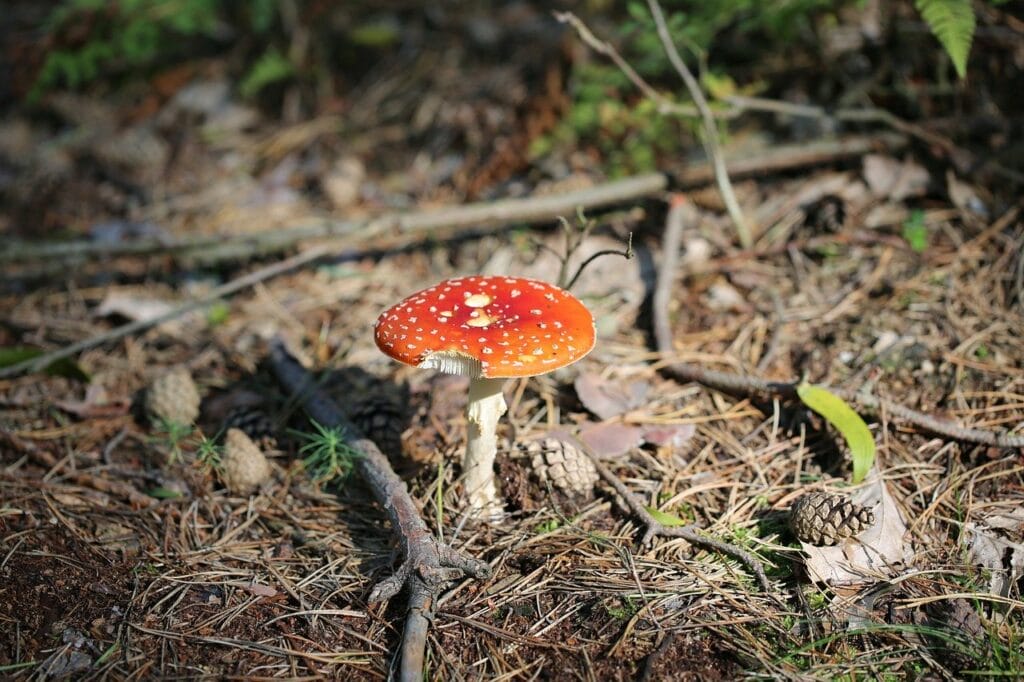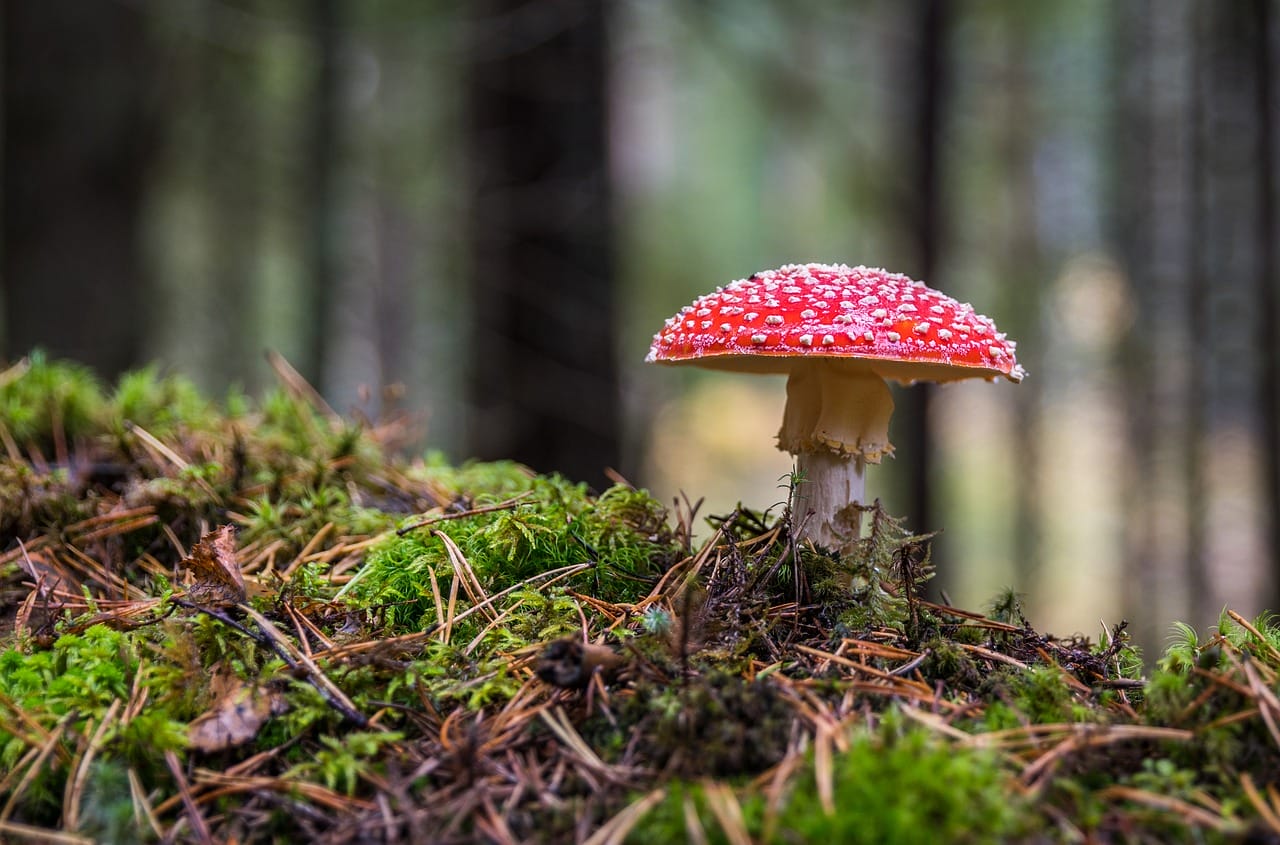Over the course of millennia, mankind has observed and consciously exploited the psychedelic traits of certain plants and fungi.
Among these, fungi, especially magic mushrooms, are regarded as the primary natural providers of psychedelic substances.
The psychedelic compound psilocybin, extracted from mushrooms, holds a prominent position in history due to its use in spiritual rituals and healing practices.
Many researchers are dedicating their resources to explore the potential health benefits of shrooms online. Current studies have shed light on the effects of psilocybin mushrooms. These findings instill hope in many people, prompting a conversation on the necessity of integrating them into Canada’s healthcare system.
Key Points:
- Magic mushrooms are a source of the psychoactive substance psilocybin, which has numerous advantages for tackling mental health problems in Canada.
- Relative to opioids, psilocybin is safer and possesses less risk of addiction and toxicity.
- Psilocybin demonstrates long-term efficacy in treating depression, with effects that may persist for up to a year.

Understanding Psilocybin
Psilocybin is an indole-alkylamine (tryptamine) that comes from magic mushrooms and has structural resemblances to lysergic acid diethylamide (LSD). Its effects comprise hallucinogenic and euphoric sensations, likely due to its interaction with serotonin (5-HT) receptors in the central nervous system.
Owing to its interaction with serotonin receptors, premium magic mushrooms demonstrate a unique capacity to aid in addressing mental health conditions.
Canada’s Mental Health and Opioid Crisis
Common Mental Health Disorders in Canada & Treatment Resistance
| 2012 | 2022 | |
| Major Depressive Episodes | 4.7% | 7.6% |
| Generalized anxiety disorder | 2.6% | 5.2% |
| Social phobia | 3.0% | 7.1% |
| Alcohol use disorder | 3.2% | 2.2% |
Over one-third (36.6%) of people dealing with mood, anxiety, or substance use disorders have reported their healthcare and mental health needs are not adequately met.
An academic paper from the Canadian Journal of Psychiatry explored the attitudes of patients with depression towards seeking treatment. This study scrutinized 1282 patient records from 135 physicians. It identified 263 patients with treatment-resistant depression (TRD), indicating a prevalence rate of 21.7% across Canada.
The Opioid Crisis
Approximately 8 million Canadians, or one in five, are dealing with chronic pain. If not managed effectively, pain can have a negative effect on different aspects of a person’s life.
Healthcare providers often recommend the use of opioid medications for managing pain. Although opioids can provide benefits like pain relief and improved functionality, they also come with potential risks.
From January 2016 to March 2022, a minimum of 30,843 deaths related to opioid toxicity were recorded in Canada. The early part of 2021 saw the highest number of such incidents, with a staggering 5,368 cases reported. It is noteworthy that over 88% of these incidents occurred in the provinces of British Columbia, Ontario, and Alberta.
Regarding Major Depressive Episodes
A study published in the Journal of Psychopharmacology recruited 27 individuals with a longstanding history of depression. The majority of these individuals had been dealing with depressive symptoms for about two years before joining the study. 88% had previously been treated with traditional antidepressants, and 58% were using such medications during their depressive episodes at the time of the study.
The study noted significant reductions in depression following psilocybin treatment for both groups. The severity of depression was found to be consistently low at the one, three, six, and 12-month follow-up intervals after treatment.
For General Anxiety and Social Phobia
A case study published in the Croatian Medical Journal in October 2021 examined HTML:
The story focuses on a
A 16-year-old boy, preferring solitude to company, sought help at a mental health clinic due to his chronic anxiety and deteriorating academic performance. His complications were further exacerbated by a learning disability and an absence of motivation for his studies. These factors rendered group therapy ineffective and too much for him to handle.
Following three sessions of psilocybin therapy over a period of 18 months, the boy exhibited significant positive changes. His anxiety lessened and his communication skills with his peers and teachers saw improvement. He began to express his feelings more freely, actively engaged in group therapy, and witnessed improved interpersonal relationships.
Treatment for Alcohol Use Disorder
A recent study published in JAMA Psychiatry on August 24 detailed a clinical trial that explored the potential benefits of integrating psilocybin and psychotherapy in treating alcohol use disorder. The progress of 93 patients with the disorder was closely monitored for a period of 32 weeks.
Out of the participants who underwent psilocybin-assisted therapy (a total of 48 individuals), a remarkable decrease of 83% in alcohol consumption was observed within eight months of their initial dose, compared to a 51% reduction in the placebo group. Almost half of the participants who were treated with psilocybin ceased drinking completely.
Addressing the Opioid Crisis
Elena Argento, a postdoctoral fellow at the University of British Columbia and BC Centre on Substance Use, is currently investigating the therapeutic use of psychedelics.
Argento suggests that psilocybin can help reduce addiction risks by influencing both neurobiology and psychology. She underscores the transformative experiences that psychedelics can provide, characterized by a profound sense of awe and self-transcendence. These experiences often enable individuals to discover new meanings and objectives in life, which can lead to behavioural changes, especially in relation to addiction.
In a recent longitudinal study conducted by Argento and the BC Centre on Substance Use, they found a significant decrease in the likelihood of persistent daily illicit opioid use among those who had recently used psychedelics or had done so in the past six months.
Furthermore, Argento’s 2018 study suggested that the use of psychedelics could potentially act as a protective measure against the link between prescription opioid use and suicide risk.
Another study identified a connection between psilocybin use and a decreased risk of opioid use disorder. This earlier study suggested a 40% reduced risk of opioid misuse and a 27% lower risk associated with opioid dependence over the.
Psychedelic use has been prevalent over the last year.
Health Canada and Other Regulatory Entities Should Consider Psilocybin as Part of Canada’s Therapeutic Approach
Even though Psilocybin is recognized for its possible positive effects on Canadians’ mental health, it remains hard to obtain. Health Canada allows healthcare professionals to administer this treatment under the Special Access Program. However, the stringent guidelines of the program create significant hurdles for many professionals and patients.
The therapeutic use of psilocybin-containing mushrooms could revolutionize mental health care in Canada by offering potentially transformative benefits. Instead of depending on traditional, and often less effective treatments like pharmaceuticals or opioid replacement therapy, psilocybin therapy provides an alternative with the possibility for deep and lasting effects.
Research indicates that psilocybin therapy could provide enduring benefits, potentially saving patients substantial costs on ineffective treatments. Moreover, studies suggest that psilocybin is relatively safe, with low toxicity, minimal risk of misuse, and infrequent overdose incidents.
Where Can One Buy Psilocybin Online?
If Canadians struggle to access psilocybin therapy, they can purchase magic mushrooms online to mitigate their current conditions. They can explore a vast range of magic mushroom products, from high-dose shrooms to microdose magic mushrooms.
High-dose shrooms include psychedelic mushrooms available in multiple formats such as dried magic mushrooms, edibles, or beverages, which are consumed for their hallucinogenic and therapeutic effects.
Microdosing magic mushrooms involves products containing minimal amounts of magic mushrooms. These products come in capsules, shroom edibles, or shroom tea. Buying shrooms online offers an alternative way to discreetly experience the benefits of these mushrooms. Where To Buy Shrooms Canada exclusively offers premium magic mushrooms online, ensuring top-notch quality.
Is Psilocybin a Suitable Option for Canadian Healthcare?
Psilocybin is frequently misunderstood due to its recreational use. It’s imperative to note that psilocybin has a safer profile compared to opioids and other drugs typically used in healthcare settings.
An increasing amount of evidence suggests its potential benefits, similar to those of marijuana, in treating various mental health conditions. dimensions of reality.
Magic mushrooms have been utilized in the realm of wellness to bolster mental health therapies and foster personal development.
What potential risks and side effects are associated with magic mushrooms?
Magic mushrooms can trigger a range of effects, both beneficial and harmful. These may encompass hallucinations, altered perceptions, and psychological shifts. On the negative side, they might provoke nausea, dizziness, and in rare instances, psychological distress. It’s crucial to exercise prudence and respect when using magic mushrooms, acknowledging the possible risks. It is always advisable to consult with a healthcare professional before initiating any new regimen that includes magic mushrooms.
Is it secure to purchase magic mushrooms online?
Purchasing magic mushrooms online can be safe, as long as you select a trustworthy source. It’s crucial to carry out comprehensive research about the product, brand, and online dispensary before finalizing a purchase. Customer feedback and ratings can serve as valuable indicators of product quality and the trustworthiness of the service. Always opt for dispensaries that put customer safety and satisfaction first and provide secure payment methods.
Can I cultivate my own magic mushrooms?
Yes, it is feasible to grow magic mushrooms at home, which can be a rewarding endeavor. However, it necessitates specific conditions and a comprehensive understanding of the cultivation process. There are numerous kits and guides available online to aid you on your cultivation journey. However, bear in mind that the legality of cultivating magic mushrooms varies by location, so ensure compliance with your local laws and regulations.
In the context of wellness, some people opt for a more measured approach, consuming small quantities of mushrooms to harness their benefits without triggering hallucinations.Articles That May Be of Interest:





